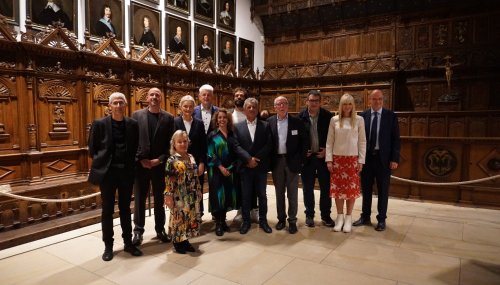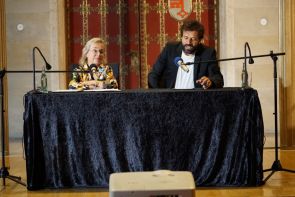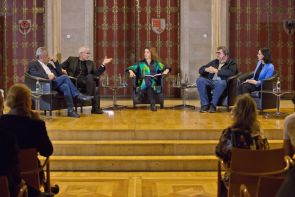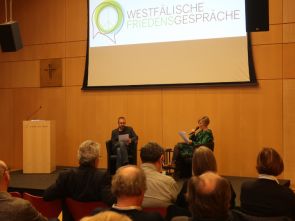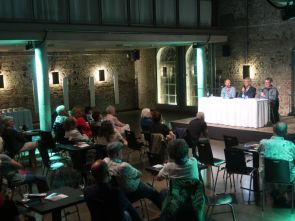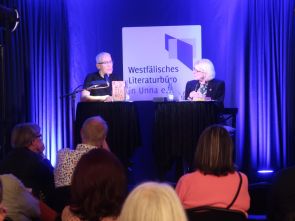The 2023 Westphalian Peace Talks
International literature as a conflict resolution strategy
Authors from two countries or regions in conflict with each other develop a visionary approach to engaging with each other in a different way. The intention is to generate new stimuli by which the deadlock in political or diplomatic dialogue can be broken. This is the fundamental concept at the heart of the literature project entitled "Westphalian Peace Talks". Through their willingness to listen to and respond to each other, participating authors are to use available literary tools to examine the prevailing opinions, views and prejudices in their respective civil societies, and to scrutinize and discuss them, including in relation to official policy pronouncements. The argument for this is that authors share a common ability to view and depict conflicts in their own way, i.e. through literature. They are not constrained by precepts or political strategies; they can adopt new positions and in doing so consider the parameters of the conflict - economic, political, geographical, religious and cultural - from a different perspective.
Spain - Catalonia
In its first phase in 2023, the project addressed the centuries-old conflict between the Spanish region of Catalonia and the central government in Madrid. This conflict dates back to the time of the Thirty Years' War, but outlived the historic Peace of Westphalia in 1648, and has once again become explosively topical, not least against the background of the Spanish parliamentary elections, which were called early. The Spanish constitution makes no provision for an autonomous region to secede. However, various future developments are conceivable, such as a referendum throughout Spain, or a constitutional amendment by the Spanish Parliament. Such hurdles, seemingly insurmountable and polarizing, are faced not only by politicians, but also by citizens.
With the support of the German-Iraqi writer Najem Wali, the project's curator and the source of inspiration for it, the two authors José Ovejero (Madrid) and Jordi Puntí (Barcelona) spent several months addressing the Catalonian issue intensively as part of the "2023 Westphalian Peace Talks", endeavouring together to find new perspectives on it. In numerous emails, they reviewed and honed their own positions and read and challenged each other’s arguments, in the process jointly developing new approaches to pacifying the centuries-old conflict.
Based on the observations he had made, in July 2023 Najem Wali produced the following text, which was first published on 16 September 2023 in the Frankfurter Allgemeine Zeitung. In it, he describes the courage demanded of a person to question their own views in such a dialogue:
Najem Wali: Facing up to disaster with words >
Wali also delivered this text in the form of the formal opening speech of the 2023 Westphalian Peace Talks at a high-profile international panel discussion held in Münster on 21 September. Over 150 guests, who included representatives from the PEN Center Germany, PEN international and the German Publishers and Booksellers Association, attended this special event in the festival hall of Münster’s historic town hall. Not only was the venue symbolic: the same was also true of the timing, namely the marking of "375 Years of the Peace of Westphalia", a point emphasized by the Mayor of Münster, Angela Stähler, and by the 1st Chairman of the Westphalian Literature Office, former Minister of State Wolfram Kuschke, in their welcoming addresses.
On the stage in Münster, well-known TV actors Kai Schumann and ChrisTine Urspruch began by reading translated passages from the correspondence between Ovejero and Puntí. The audience responded with sustained applause. Following the break, the moderator for the evening, Catalina Rojas Hauser (from the Kulturrat NRW cultural council), engaged in conversation with the Spanish poet and philosopher Laura Casielles and with Ovejero, Puntí and Wali. All were of the opinion that, as Casielles put it, literature can enhance imagination, pose new questions, and look at politics from a new perspective. Although distance remained between the views of the conflict, she said, the glimpses into the dialogue between the two authors and the panel discussion both demonstrated impressively that the fundamental idea of the project had passed its first practical test.
José Ovejero and Jordi Puntí have summarized their own views of the course of the 2023 Westphalian Peace Talks and their results in this jointly formulated review:
José Ovejero, Jordi Puntí: Reflections on a peaceful dialogue >
A second discussion by an international panel took place just over a month later in Frankfurt, on the day of the award ceremony for the Peace Prize of the German Book Trade. On 22 October, over 60 guests were present in the Haus am Dom, located very close to Frankfurt's St. Paul's Church, to hear the concluding discussion under the heading "Literature as a peacemaker". Anja Bergmann, Managing Director of the NRW regional office of the German Publishers and Booksellers Association, and Heiner Remmert, Director of the Westphalian Literature Office, began with a reading of Ovejero's and Puntí's "Reflections on a peaceful dialogue". This was followed by a discussion moderated by Dr Lisa Straßberger, Head of Literature at the Haus am Dom. Puntí and Ovejero - the latter unable to attend in person for health reasons, and joining the event by video link - looked back once again at the preceding months, together with the curator, Najem Wali. Other current crises and wars were also referred to in the discussion.
Based on this positive and insightful experience, the Westphalian Literature Office intends to continue its cooperation with Najem Wali, the project's curator and source of the inspiration for it, and to organize further iterations of the "Westphalian Peace Talks" in the future. These are to address other international conflicts, such as the Northern Ireland conflict post-Brexit, and the ongoing tensions between Turkey and Greece.
The "2023 Westphalian Peace Talks" project was conducted by the Westphalian Literature Office in Unna with the participation of PEN Center Germany. The talks were based on a concept by Najem Wali (artistic curator) and were made possible by funding and support from the Kunststiftung NRW (Art Foundation NRW), the Westfalen-Initiative (Westphalia Initiative Foundation), the LWL Cultural Foundation and the Ministry of Culture and Science of the State of North Rhine-Westphalia. The German Federal Minister for Economic Cooperation and Development, Svenja Schulze, assumed patronage of the talks.
Numerous other literary events were held as part of the supporting programme.
Click here for the entire program >
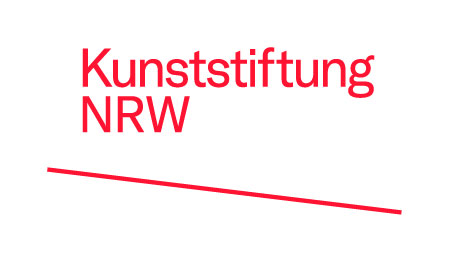 |
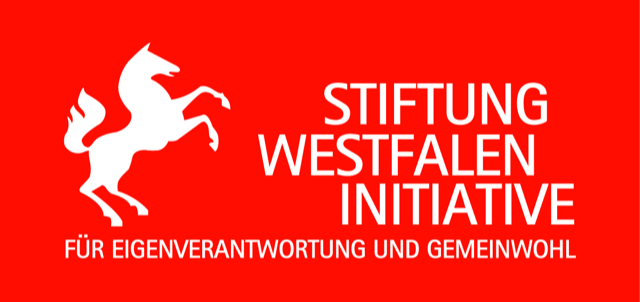 |
|
|

